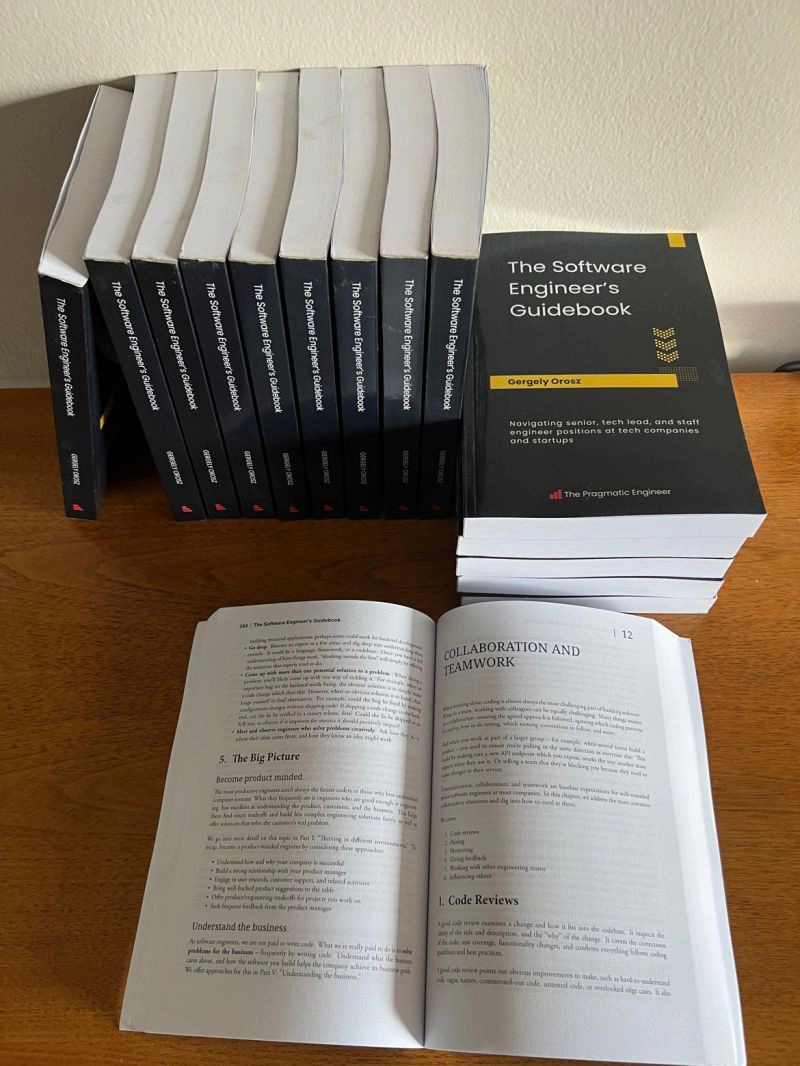Visionary Digital Evolution Strategist
Rooted in Formula 1 excellence, with over 30 years in IT starting as a child in the 1980s, …

Hello, my fellow digital warriors ⚔️ and all you tech-savvy enthusiasts out there!
I’ve got some news that’s got me buzzing like a server farm on Black Friday. Recently, I hit a major milestone in my tech journey, and I just have to share it with you all. As a tech lead, I’ve always been all about pushing the envelope on software craftsmanship and creating a dev culture that’s as solid as our codebase. And now, I’ve received a killer nod of approval from none other than Gergely Orosz —a name that’s basically the gold standard in our community.
In this post, I’m going to dive into this achievement, break down the influence Gergely has had on me and the IT community, and give you the lowdown on his latest masterpiece, The Software Engineer’s Guidebook. Trust me, in a market where everyone’s jumping on the AI bandwagon and cutting corners like there’s no tomorrow, we need a reality check before we all end up swimming in a sea of sloppy, half-baked software. Let’s dig in!
Becoming a tech lead? It’s not just a stroll in the park—it’s more like a marathon through a maze, with a few fire-breathing dragons thrown in for good measure. This role demands a blend of technical prowess, leadership finesse, and a deep understanding of the human psyche. I’ve had the privilege (and the occasional migraine) of leading projects that required both cutting-edge tech solutions and a steady hand to guide the team toward success. This privilege is something I’ve committed to for nearly 30 years in IT, with the last decade dedicated to refining my research on the Unicorns’ Ecosystem and the Software Craftsmanship Dojo®—a holistic platform aimed at evolving both organizations and individuals toward elite mastery.
Recently, I had one of those “pinch me, I must be dreaming” moments when Gergely gave me the nod as a top pick for tech leadership conferences in his latest Pragmatic Engineer article. This isn’t just another line on my résumé—it’s a stamp of approval on the values I’ve championed throughout my career (and trust me, you’ll want to stick around to catch a teaser of Gergely’s latest book!). Being recognized by someone of Gergely’s caliber feels like winning the tech community’s version of an Oscar 🥇. It’s a proud moment, but also a clear sign to keep growing, keep learning, and keep leveling up. Now, as I just entered the big 5-0 club 🎂, my focus is shifting from being knee-deep in organizational evolution to mentoring and shaping the tech leaders of tomorrow.
For those who may not be familiar, Gergely Orosz is a name synonymous with excellence in software engineering and leadership. With an illustrious career that includes roles at companies like Uber, Microsoft, and Skyscanner, Gergely has established himself as a thought leader in the tech industry. His insights, drawn from years of hands-on experience, are highly regarded by professionals across the globe.
Gergely is perhaps best known for his newsletter, The Pragmatic Engineer, which has become a must-read for anyone serious about advancing their career in software engineering. His ability to distill complex topics into actionable insights has made him a trusted voice in the community. Whether you’re an engineer looking to sharpen your technical skills or a leader seeking advice on managing teams, Gergely’s work provides invaluable guidance.
The Pragmatic Engineer isn’t just another newsletter clogging your inbox—it’s like a Swiss Army knife for software engineers, packed with tools you didn’t even know you needed. Gergely Orosz covers everything from technical best practices to career hacks and industry trends, but what really sets this newsletter apart is its no-nonsense, get-your-hands-dirty approach. Gergely doesn’t just theorize; he dishes out real-world advice you can start using before you’ve even finished your coffee.
In my own tech lead journey, The Pragmatic Engineer has been nothing short of a lifeline. Gergely’s insights into leading engineering teams, tackling gnarly technical challenges, and cultivating a kickass team culture have directly fueled my own research. His advice on maintaining code quality—especially through code reviews and continuous testing—echoes the principles of Software Craftsmanship I’ve been championing for the past 14 years. It’s like having a secret weapon in those boardroom battles, where I can turn heated debates into objective discussions about the ROI of solid engineering practices, instead of letting the money-focused suits steamroll over the software lifecycle.
What’s more, Gergely’s insights have sparked countless ideas for my own research. They’ve helped me refine my KBI framework, which correlates individual, team, and organizational behaviors with predictable outcomes. This framework has been a game-changer, shifting finger-pointing ego wars into data-driven, pragmatic discussions about how an organization should evolve. Thanks to The Pragmatic Engineer, I’ve been able to back up my theories with hard data, proving that good software engineering isn’t just nice to have—it’s essential for success.
Gergely Orosz has authored several books that serve as essential guides for software engineers at all stages of their careers. His latest book, The Software Engineer’s Guidebook, stands out for its comprehensive coverage of the principles and practices that define excellence in software engineering.
One of the aspects I admire most about The Software Engineer’s Guidebook is Gergely’s emphasis on the importance of Software Craftsmanship. In a world where software is constantly evolving, maintaining high code quality is crucial for long-term success. Gergely highlights how readable code not only enhances maintainability but also fosters better collaboration within teams. This focus aligns perfectly with the principles of my own Software Craftsmanship Dojo, where we prioritize writing clean, understandable code that stands the test of time.
Gergely also champions a test-first approach, which I believe is a cornerstone of effective software development. By writing tests before implementing features, we can ensure that our code meets the required specifications from the outset. This approach reduces the likelihood of bugs and enhances the reliability of our software—principles that are deeply ingrained in the practices we follow in the Dojo.
Another key theme in the book is Domain-Driven Design (DDD), a methodology that emphasizes the importance of understanding the business domain when designing software. Gergely’s exploration of DDD in The Software Engineer’s Guidebook provides valuable insights into how we can align our technical solutions with the needs of the business. This approach not only leads to better software but also fosters a deeper connection between the development team and the stakeholders, ensuring that we’re all working toward the same goals.

–
Many more gems await you in this masterpiece, but let me tell you—getting your hands on a copy and diving into it like a college kid cramming for finals is a game-changer. This book will flip the switch on your understanding of what the market needs versus what it thinks it wants—two things currently in stark contrast in our shaky IT landscape. Sloppy software isn’t just a financial sinkhole; it can cost lives. But hey, that’s a rabbit hole we’ll dive into in an upcoming article.
For now, I’m still pinching myself—a guy from a tiny village in the Dolomiti mountains being recognized as a tech leader by Gergely Orosz? Yeah, that’s a milestone I’m damn proud of. This moment isn’t just about me; it’s a testament to the collective effort of everyone I’ve had the pleasure to work with. Whether you’re just getting your feet wet in software development or you’re a seasoned pro, I can’t recommend enough that you explore Gergely’s work. Step into my Software Craftsmanship Dojo®, and avoid getting tangled in the dysfunctional web of cost-cutting and buzzword bingo. These resources, along with others I’ve shared in past articles, can elevate your craft and help you carve out a path toward becoming a future IT tech lead—someone who’s not just shaping code, but shaping the very future of our industry.
To stay in the loop with all our updates, be sure to subscribe to our newsletter 📩 and podcast channels 🎧:
🎥 YouTube
📻 Spotify
Visionary Digital Evolution Strategist
Rooted in Formula 1 excellence, with over 30 years in IT starting as a child in the 1980s, …